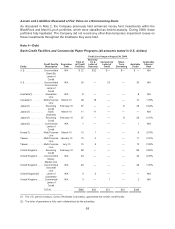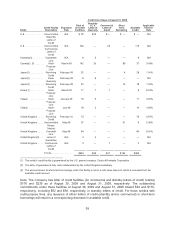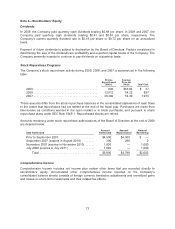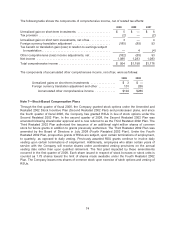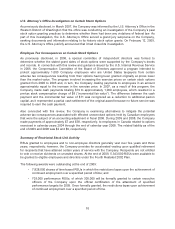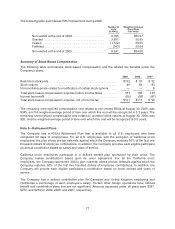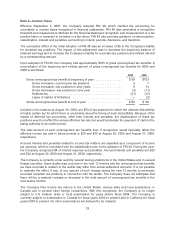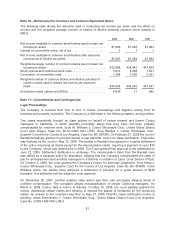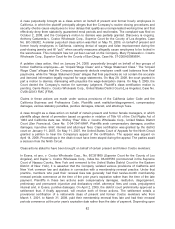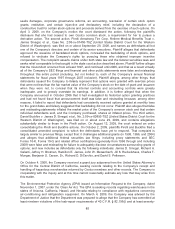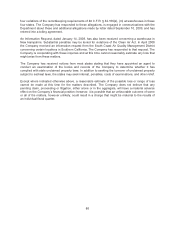Costco 2009 Annual Report Download - page 80
Download and view the complete annual report
Please find page 80 of the 2009 Costco annual report below. You can navigate through the pages in the report by either clicking on the pages listed below, or by using the keyword search tool below to find specific information within the annual report.
Note 9—Income Taxes
Effective September 3, 2007, the Company adopted FIN 48, which clarified the accounting for
uncertainty in income taxes recognized in financial statements. FIN 48 also prescribes a recognition
threshold and measurement attribute for the financial statement recognition and measurement of a tax
position taken or expected to be taken in a tax return. FIN 48 also provides guidance on derecognition,
classification, interest and penalties, accounting in interim periods, disclosure, and transition.
The cumulative effect of the initial adoption of FIN 48 was an increase of $6 to the Company’s liability
for uncertain tax positions. The impact of this adjustment was to decrease the beginning balance of
retained earnings and to increase the Company’s liability for uncertain tax positions and related interest
by a corresponding amount.
Upon adoption of FIN 48, the Company had approximately $103 of gross unrecognized tax benefits. A
reconciliation of the beginning and ending amount of gross unrecognized tax benefits for 2009 and
2008 is as follows:
2009 2008
Gross unrecognized tax benefit at beginning of year ................. $98 $103
Gross increases—current year tax positions .................... 9 7
Gross increases—tax positions in prior years ................... 6 13
Gross decreases—tax positions in prior year .................... (2) (11)
Settlements ............................................... (31) (12)
Lapse of statute of limitations ................................ — (2)
Gross unrecognized tax benefit at end of year ...................... $80 $ 98
Included in the balance at August 30, 2009, are $50 of tax positions for which the ultimate deductibility
is highly certain but for which there is uncertainty about the timing of such deductibility. Because of the
impact of deferred tax accounting, other than interest and penalties, the disallowance of these tax
positions would not affect the annual effective tax rate but would accelerate the payment of cash to the
taxing authority to an earlier period.
The total amount of such unrecognized tax benefits that, if recognized, would favorably affect the
effective income tax rate in future periods is $20 and $35 at August 30, 2009 and August 31, 2008,
respectively.
Accrued interest and penalties related to income tax matters are classified as a component of income
tax expense, which is consistent with the classification prior to the adoption of FIN 48. During the year,
the Company recognized $4 of interest expense and penalties. Accrued interest and penalties are $20
and $24 at August 30, 2009 and August 31, 2008, respectively.
The Company is currently under audit by several taxing jurisdictions in the United States and in several
foreign countries. Some audits may conclude in the next 12 months and the unrecognized tax benefits
we have recorded in relation to the audits may differ from actual settlement amounts. It is not possible
to estimate the effect, if any, of any amount of such change during the next 12 months to previously
recorded uncertain tax positions in connection with the audits. The Company does not anticipate that
there will be a material increase or decrease in the total amount of unrecognized tax benefits in the
next twelve months.
The Company files income tax returns in the United States, various state and local jurisdictions, in
Canada and in several other foreign jurisdictions. With few exceptions, the Company is no longer
subject to U.S. federal, state or local examination for years before fiscal 2004. The Company is
currently subject to examination in Canada for fiscal years 2002 to present and in California for fiscal
years 2004 to present. No other examinations are believed to be material.
78


